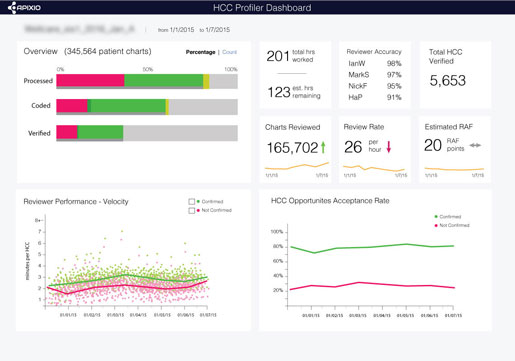Meet the IBM Watson Health Competitor Turning Elusive Data into Individualized Care
Apixio, a data science company focused exclusively on healthcare, is using its novel Iris cognitive computing platform to access massive amounts of clinical information and build individual care profiles for patients.
November 20, 2015

Marie Thibault
Apixio's HCC Profiler, based on the Iris platform, is used to calculate accurate risks for patients.
You've heard of IBM Watson Health, but how about Apixio? The San Mateo, CA-based company, founded six years ago, is dedicated solely to healthcare insights through cognitive computing and this week unveiled its Iris platform.
The Iris platform uses natural language processing and machine learning to gain access to the almost 80% of data locked away in the 1.2 billion clinical care documents created annually in the United States, according to a company press release. Because this information is sometimes written by different physicians, is often unstructured, and each patient's medical records can be spread across several systems, this data is difficult to access.
Apixio CEO Darren Schulte, MD, likens healthcare data to a jigsaw puzzle thrown into the air: "It just kind of falls all over the place and the pieces are strewn about. Pieces of your data can be in many different record systems, can be written by many different types of specialists—you've got to assemble it together and then try to create some kind of profile that's accurate, as a starting point."
Iris's self-learning system, which has reviewed 500 million documents, can extract data from scanned files, PDFs, and electronic healthcare records (EHRs), making analysis of this information possible.
Schulte describes Apixio as a company "trying to tackle foundational problems" by allowing analysis of information beyond billing data, which he calls "noise and inaccurate." Instead, Iris is tapping into the 80% of data that includes patients' clinical narrative, he says."It really starts with knowing the picture of the patient."
Apixio offers the HCC Profiler, which is based on the Iris platform. The HCC Profiler is used to draw findings from clinical information and billing data to calculate accurate risk scores for patients. According to the company, this proactive bent allows medical providers to anticipate the needs of specific patients, as well as quickly and accurately review and code medical charts and find an average 10% more supported Hierarchical Condition Category (HCC) codes.
The HCC Profiler has already delved into more than 2 million patient records, Schulte says, since Apixio works with more than a dozen health plans of all sizes. Health plans and providers allow Apixio secure access to their electronic medical record (EMR) systems or manually print, scan, and fax or send records securely to the company. This tool helps physician groups and providers gain a better understanding of the financial risk for their Medicare population and can enable proactive, preventive care.
"At Hill Physicians Medical Group, we pull nearly 11,000 patient charts for review each year. We've previously relied on tedious manual review of our charts that required lots of manpower and physician time," said Jennifer Pereur, director of Government Programs, in a press release. "The HCC Profiler has allowed us to mine our EHR and scanned chart data for valid, risk-adjusting conditions with incredible transparency and efficiency. Not only does it automate the process of verifying HCC codes, but it helps us ensure an accurate clinical record which enables us to deliver high-quality care to the patients we serve."
"We're not simply waiting for the patient to come in to the office," says Schulte. "Let's understand what might there be in terms of potential costs or potential morbidities that an individual is going to experience, and understand that to get on top of those conditions and better help the patient." Schulte adds that risk scores allow insurers and providers to estimate what healthcare costs and treatments you might require in the next year.
This technology opens dramatic possibilities. Schulte notes that today, studies show that more than 50% of recommended care is not actually given daily to patients. The next step with the Iris platform, which may potentially be available early in 2016, is to show providers what care has and has not been provided to patients, so that doctors and caretakers can give better care.
As for the constant comparisons to the well-known IBM Watson Health, Schulte doesn't hesitate to draw a distinction. "We're Watson that works," he says, pointing out that while IBM Watson is a super reader of digitized documents and medical literature to determine clinical decision making, Iris is mining patient records and individual medical narratives to enable answers for personal care.
What's more, since much of medical care and evidence-based practice guidelines is not based on randomized clinical trials and even those trials can't always be generalized to a specific individual, Schulte envisions a future with virtual clinical trials and insights from real-world clinical data generated from millions of patient care profiles.
"As a physician, I'm quite excited about this era of data-driven medicine, to get us out of what I call the 'dark ages' of medicine," Schulte says.
Check out the future of medical technology—register for the BIOMEDevice San Jose Conference, December 2-3, 2015. |
Marie Thibault is the associate editor at MD+DI. Reach her at [email protected] and on Twitter @medtechmarie.
[Image courtesy of APIXIO, INC.]
You May Also Like


